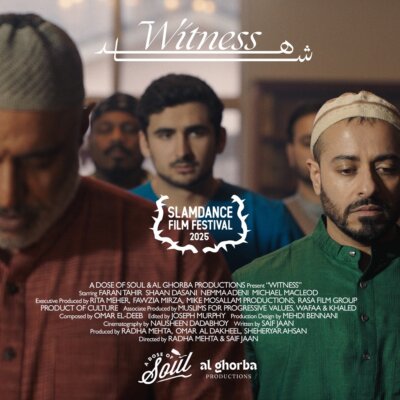 The short film Witness opens with a ringing phone, just as a wedding ceremony “nikah” is about to take place in a masjid. The groom, Saleem, gives a sheepish grin as the call goes to voicemail—his witness is unavailable. The imam, the bride, and the bride’s father exchange exasperated glances before Imam Mustafa steps away to find their second male witness.
The short film Witness opens with a ringing phone, just as a wedding ceremony “nikah” is about to take place in a masjid. The groom, Saleem, gives a sheepish grin as the call goes to voicemail—his witness is unavailable. The imam, the bride, and the bride’s father exchange exasperated glances before Imam Mustafa steps away to find their second male witness.
In the kitchen, his daughter, Miral, and her friend, Shams, are preparing donation boxes. When Imam Mustafa asks Shams to step in as the second male witness, he hesitates. His reluctance is clear, but the imam brushes it off. Miral and Shams share a weighted glance before he follows the imam back to the ceremony.
Later, Saleem shares happy news—his wife is pregnant—but an offhand comment about his work as an endocrinologist shifts the mood. He starts watching Shams more closely. Soon after, Saleem rifles through Shams’ belongings, and when Imam Mustafa questions him, Saleem shoves a pamphlet into his hands. What follows is a tense, emotional reflection on the intersection of faith, identity, safety, and justice.
Co-Director and Producer Radha Mehta caught up with Disability Belongs™ for an interview on the importance of this film. Mehta is a 2023 alumna of the Disability Belongs™ Entertainment Lab, Los Angeles Cohort, and 2024 Documentary and Unscripted Intensive.
Q: What made Witness a story you needed to tell, and what conversations do you hope it sparks?
Mehta: Witness, to me, is a story about leading with love in spite of discrimination we experience within our own South Asian cultures and religions. When Saif Jaan initially shared his story with me, I felt so compelled to ensure his story gets made and was willing to do whatever it took to make that happen. Given my past films explore identity and shame within our diasporas, I felt it was necessary to help shine a light on the topic of LGBTQIA+ acceptance that Saif mentioned was quite feared to ever be addressed within the Muslim culture, particularly within a Muslim place of worship. Our hope is this film enables a willingness to start conversations on acceptance, leading to our ultimate hope of embracing acceptance with pure love. The world needs that type of love now more than ever.
Q: Shams is in a precarious position, and even before viewers understand why, they can see the tension in his demeanor. What role do you think faith leaders like Imam Mustafa can play in the safety and well-being of people like Shams?
Mehta: Once there’s an understanding that we’re all humans born with souls that were stripped of all identities society eventually placed on us, then one can easily discover that we’re all quite alike in our core essence. I believe one of the greatest gifts of understanding self-worth is having the ability to love others, and similarly, feeling loved by others. No one can deny that as our most basic need. So, a faith leader like Imam Mustafa can practice what they preach. Lead with love with the understanding that love, at its core, is shared universally and unconditionally.
Q: Can you talk about the significance of casting a transgender actor, Shaan Dasani, as Shams? What did Shaan bring to the character that impacted the film?
Mehta: Saif and I felt casting a transgender actor for the role of Shams was an absolute must, or there would be no film. That authenticity for us was our first priority. Shaan Dasani brought a true understanding and nuance to “Shams” based on his own personal life experiences as someone whose spiritual identity is just as integral to him as his trans identity. While he had found a way to reconcile these parts of himself, others around him were on their own journey to understand and accept. Shaan indicated to us that those journeys require so much patience but should not deter one from being their true selves.
Q: The visual imagery in Witness is stunning, particularly the final scene where viewers see shots of the masjid while hearing the imam’s phone ring. What went into those stylistic choices, and how did you use cinematography to heighten the emotional weight of the story?
Mehta: Thank you for noticing! Making this film was such a beautiful collaboration across all our principal team members (our DP Nausheen, our Producers Omar and Sheheryar, our Production Designer Mehdi, and our Editor Joe). Saif and I wanted the best for the story, so although we had a plan for execution, we always kept an open mind as to how others’ ideas could elevate the story every step of the way. The fact that we were so open to collaboration allowed all of us to give our hearts to the project. Saif and I always knew how the film would end sonically (phone ringing) but visually, we came together as a team to select shots that gave us a sense that when there’s a lack of acceptance, then the overall community falters.
Q: The film doesn’t give a clear answer about what happens after Imam Mustafa makes that call. Why was it important to leave the ending open-ended and what do you want viewers to take away from that moment?
Mehta: For us, the film gives a clear answer that a conversation can finally begin between the Imam and Shams towards a greater understanding of one another. Because the film focuses on the Imam’s POV, we wanted to give him ownership to make that first move.
The part that may feel open-ended is what they will actually discuss. We wanted the audience to wonder that and perhaps feel a sense of responsibility to take up those conversations within their own circles on the topic of acceptance, particularly of the LGBTQIA+ community.
The North American premiere of Witness is at 9:30 a.m. PT on February 23, 2025, as part of the 2025 Slamdance Film Festival in Los Angeles. Witness is not explicitly about disability, but it is featured in the Unstoppable Shorts block as a film by a disabled filmmaker, reinforcing the importance of authentic storytelling. Mehta’s previous film, “DOSH,” won the George Starks Spirit of Slamdance Award during the 2024 Slamdance Film Festival.







Great review! Now I will have to go see it!